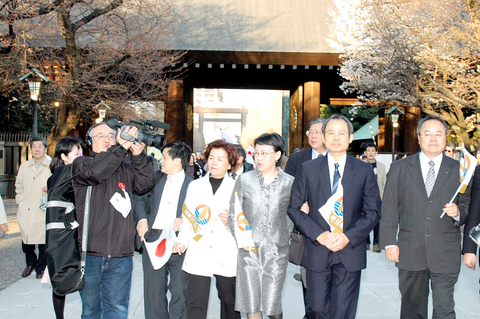The Taipei Times today published an article leading with the incredible headline Italy allows Chen entry as president. The article states:
President Chen Shui-bian (陳水扁) departed for the Vatican yesterday afternoon to join 200 state and religious leaders paying a final tribute to Pope John Paul II.
The Ministry of Foreign Affairs yesterday said the Italian government pledged to grant Chen entry to the country in his capacity as head of state.
Chen’s attendance at the papal funeral today will mark the first time a president from Taiwan has visited the Holy See since the establishment of diplomatic ties 63 years ago.
The visit will also make Chen the first president from Taiwan to set foot in a European country.
Is this in fact entirely accurate?
Let’s have a look at the article the BBC published a day before the trip happened.
A Chinese spokesman expressed “strong dissatisfaction” at Italy for granting Mr Chen a visa to go to the Vatican.
Italy has diplomatic ties with Beijing, rather than Taiwan, which China sees as part of its territory.
And later on in the same article-
If Mr Chen goes ahead with his trip, he will become the first Taiwanese president to visit the Vatican – one of only 25 nations that officially recognises Taipei diplomatically, and the only one in Europe
He is scheduled to leave Taipei on Thursday for Rome, and stay in the Vatican until after Friday’s funeral.
In fact, the Taipei Times is making a very subtle, but highly misleading mis-statement. President Chen is being received by the Vatican as a head of state, but he is not, as the Taipei Times implies, being so received by Italy. From where does this confusion arrive?
To understand, let’s go to Zimbabwe for a moment. The NYT reported this morning that-
Zimbabwe’s president, Robert G. Mugabe, arrived in Rome on Thursday to attend Pope John Paul II’s funeral, apparently using a diplomatic loophole to evade European Union sanctions that ostensibly bar him from traveling to any of the union’s member states.
[…]
Under normal circumstances, Mr. Mugabe would not be permitted to fly to Rome. He is among 95 Zimbabweans whom the European Union has barred from entering its territory on the grounds that they “commit human rights violations and restrict freedom of opinion, association and peaceful protest.”
Mr. Mugabe appears to have evaded the travel ban because he is going to the Vatican, which is not a member of the European Union. A treaty obliges Italy to grant safe passage to visitors bound for the Vatican, which has no airport.
While I imagine that Chen is certainly not a criminal like Mugabe and has as much right as any Taiwanese citizen to visit European nations as a private citizen, the assertion that he is being received as a head of state by Italy is quite false. Italy is simply giving him landing permission as a head of state on a diplimatic visit to the Vatican, but this is based entirely on their treaty obligations to the Vatican, and in no way reflects their position towards Taiwan.
Taiwan is only formally recognized as a country by a few countries around the world, in Europe only by the Vatican. The Vatican’s reasons for maintaining relations with Taiwan over communist China are clear. Unlike the other nations of the world whose responsibilities are the economic and physical safety of their citizens, the Vatican’s primary concern is the spiritual guidance of Catholics around the world. China, despite what they claim, does not allow freedom of religion, forcing Catholics to choose between either a state organized Catholic church, which was forced to cut ties to the Vatican so long ago that they still conduct Mass in Latin, or pray in secret, at risk of prosecution by Chinese authorities.
In the flurry of news related to the Pope’s funeral The New York Times also has an article on this topic. As they say,
China’s 12 million Catholics are mourning the death of John Paul II, but his passing is also a reminder of an unfinished legacy: the division of Chinese Catholics from the rest of the church, and from each other. Indeed, if John Paul II helped bring down Communism in Eastern Europe, the Communist Party that rules China proved resilient. The two sides never came to agree to normalize relations between the Vatican and China and end the diplomatic break that began more than a half century ago under Mao.
On a personal level, the pope never achieved his goal of visiting China.
Of significant interest is that fact that a Chinese spokesman for the laughably named ‘Chinese Catholic Patriotic Association’ is quoted in the BBC article above as saying “The decision to let Chen Shui-bian attend has hurt the feelings of the Chinese people, including five million Catholics.” Clearly the Vatican holds the combined interests of the 7 million hidden Catholics in China, as well as the hundreds of thousands of Catholics in Taiwan, are also worth looking out for.

